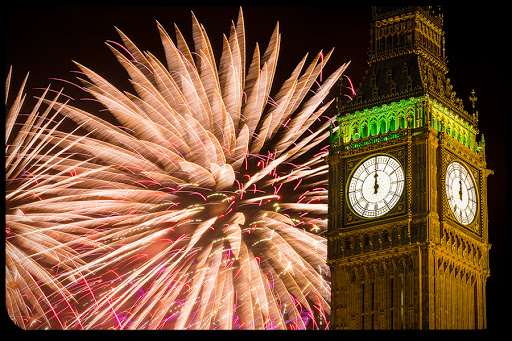Which is the New Year’s Eve that you most clearly remember? My guess is that for many people, they recall most vividly the New Year’s Eve when 1999 faded away and 2000 dawned. The New Year’s Eve that stands out for me was 1969. I was seven years old. The adults around me said that night was an extra special New Year’s Eve because, with the arrival of 1970, a new decade was beginning. They made it sound important, but I didn’t quite understand why. “What’s so important about the change of a number?,” I wondered. But I did know that it was the first change-of-decade I had seen. Since then, I’ve seen years, decades, a century and even a millennium pass. In the ensuing 45 years, we have witnessed social, political, technological, and religious changes that no one could have guessed at in 1970.
Why should we care to mark the passage of the years? Why should it matter to us to take note of the flow of cycles and of seasons? Isn’t the passage of time fundamentally a terrible thing? The passage of each moment takes each of us one moment closer to death, and the cosmos one moment closer to entropy. If death is final and the cosmos is dwindling towards nothing, why take note of that? Why, other than for a morbid fascination, should one mark out the erosion of personal and cosmic existence? If the human present is, as has been attributed to philosopher Ernest Nagel, “an episode between two oblivions,” then marking time is in fact a waste of time that cannot be recovered and can scarcely be justified.
A Christian sees time differently. We, each person and all creation, are from God. A human being is endowed with an immortal soul and is meant to move through time and into eternity—an eternity, one hopes, enjoying the presence of God. We are free to pursue or reject God Who is both our Creator and our Destiny. Time, then, is a resource entrusted to our care. It is ours to spend wisely or wastefully. Time flows into eternity, and we go with it. We rightly judge the quality of our times by how conducive they are to facilitating our entrance into an eternity of Heaven or of Hell. From this perspective, the Christian sees time as linear—a thread running from the past, to the present, into the future, and arriving at eternity.
A Christian also marks time as cyclical. Sun and moon, night and day, seasons both natural and sacred, are all part of a Christian’s life. Christians should welcome the change of seasons because we need to be reminded repeatedly of the order of growth and decline found in nature. And we need to return again and again to the mysteries of faith embedded in our recollection and reliving of the saving work of Christ on Earth. We hope that over time, we bring a more mature receptivity to the cycles of Christian mysteries and seasons.
Moving through the years, within cycles of repetitions and renewals, we can find important lessons about ourselves and about God. What I have observed since my first change-of-decade New Year’s Eve bringing in 1970 is confirmed by a study of history: human nature doesn’t change. Oh, even since 1970, we have become thoroughly more sophisticated in our ability to destroy human flesh (e.g., weapons of mass destruction and acts of terror), and our willingness to crush the human spirit (e.g., the apparatus of the surveillance State and the prevalence of internet pornography). But our need to be rescued from our vices and our reluctance to cultivate our virtues have remained constant throughout human history. (“History doesn’t repeat itself, but it does tend to rhyme very well,” has been erroneously attributed to Mark Twain, but it is a point worth pondering.)
We have been made in the divine image, and so are made for truth and goodness. Nonetheless, we war against the gift and dignity of our nature as we embrace lies and lust. Our human condition could almost bring one to despair. Almost. For the repetition of natural seasons and liturgical cycles remind us that while man does not change, neither does God.
Our Creator reveals His character—His Wisdom, Beauty and Goodness in the order of creation. And God reveals His willfully stubborn love for us in the saving work of His Son and the sanctifying work of His Church.
As one year fades away and a new one arises, we may rightly rejoice, for we are not adrift on a downward spiraling flow of time. Time is given to us as a gift and as a responsibility. Just as an artist may work in oils or clay, for us humans, time is our creative medium. We can work within the rhythms and cycles of time and the uniqueness of our own times to prepare ourselves (with God’s grace) for an eternal delighting in God’s own joy and glory.
So, let’s celebrate the passing of an old year and the beginning of a new year. Let’s soberly and humbly plan our New Year’s Resolutions. Let’s do all that with gratitude and a clear sense of mission, for we in time are made for eternity.
When I write next, I will discuss the crisis of manhood in our culture and in the Church. Until then, let’s keep each other in prayer.
Father Robert McTeigue, S.J.is a member of the Maryland Province of the Society of Jesus. A professor of philosophy and theology, he has long experience in spiritual direction, retreat ministry, and religious formation. He teaches philosophy at Ave Maria University in Ave Maria, FL, and is known for his classes in both Rhetoric and in Medical Ethics.

